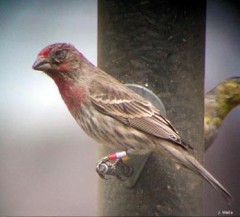Dana Hawley
Professor of Biological Sciences
Dana Hawley
Professor of Biological Sciences

Location:
363C Steger Hall (MC 0477)1015 Life Science Circle
Blacksburg, VA 24061
USA
>Hawley Lab Members
>Selected Publications
Courses Taught
- BIOL 4404: Ornithology
- BIOL 4564/5564: Infectious Disease Ecology

Current Research
My research program investigates the ecological and evolutionary mechanisms that underlie host susceptibility, pathogen virulence, and transmission. I approach disease ecology from a multi-disciplinary perspective in order to understand how individual physiology, pathogen virulence, social behavior, and environmental context all interact to influence infectious disease dynamics. My current research projects are briefly described below:
- Social behavior and disease. Social behavior in animals can have profound effects on susceptibility to infectious diseases and their transmission within and between groups. In turn, infected animals often change their behavior in ways that may influence their likelihood of spreading a pathogen. My lab studies both directions of this relationship- how behavior influences disease (via both exposure and susceptibility), and in turn, how disease alters behavior in transmission-relevant ways.
- Evolution of pathogen virulence in a novel host. We recently documented the evolution of increasing virulence in a directly-transmitted pathogen of North American house finches - Mycoplasma gallisepticum. This pathogen is a Mollicute (wall-less) bacterium that relies strongly on its host for survival, and therefore would be predicted to cause minimal virulence in order to maximize its own transmission. We are testing whether incomplete host immunity can select for higher virulence in this system by favoring pathogen isolates that are sufficiently virulent to infect and transmit between individuals with some pre-existing immunity.
- Causes and consequences of phenotypic immune variation. My lab studies the intrinsic (hormones, genetics) and extrinsic (temperature, social environment) factors that influence immune function as well as the consequences of immune variation for disease susceptibility and transmission. In the house finch-Mycoplasma system, the clinical signs of disease are largely caused by the host immune response rather than direct damage by the pathogen. Thus, non-intuitively, individuals with the strongest immune response may contribute the most to transmission in this system. More broadly, we are interested in the ecological and evolutionary causes and consequences of immune variation in natural populations.


